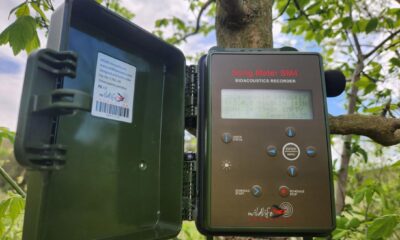Science
Fossils of Potential Early Animal Named After Punk Rock Icon
Recent research may have redefined a significant chapter in the history of early life on Earth. A group of fossils previously dismissed as mere organic debris has been identified as an early animal species, now named Lydonia jiggamintia. This discovery, detailed in the journal Palaeontologia Electronica on September 16, 2023, brings exciting insights into the evolution of organisms that existed over half a billion years ago.
Paleontologist Christopher McKean and his research team analyzed 39 fossils originally classified as Blackbrookia. These specimens were discovered along the coast of Newfoundland, particularly near an area known as Mistaken Point, renowned for housing some of the oldest animal fossils ever found. The region has produced remarkable discoveries, including a jellyfish fossil estimated to be around 570 million years old, highlighting its significance in paleontological research.
The newly identified L. jiggamintia measures up to 53 centimeters in length and is characterized by its unique appearance, which has drawn comparisons to a punk rock hairstyle. Its structure features fingerlike tubes that extend vertically, indicating it likely fed by filtering nutrients from the water above. The creature’s rounded and pointed shape suggests it adapted to its environment, possibly taking on characteristics based on the organisms beneath it.
Historic Significance and Cultural Connection
McKean, who is now affiliated with the University of Essex in England, emphasizes the rarity of Precambrian animal fossils, particularly those potentially related to existing species. The identification of L. jiggamintia not only expands our understanding of early life forms but also connects to the cultural heritage of the region. The species name is inspired by the jiggamint, a spiky wild fruit referenced by the Beothuk peoples, who inhabited Newfoundland long before European settlers arrived.
The discovery challenges long-held perceptions of these fossils as mere remnants of decomposed material. The spongelike pores of L. jiggamintia were crucial in distinguishing it as an animal rather than organic debris. As McKean notes, this finding is significant for the scientific community, enhancing our understanding of the origins and diversity of life during the Precambrian era.
As research continues to unveil the complexities of early organisms, Lydonia jiggamintia stands as a testament to the ongoing pursuit of knowledge in the field of paleontology. The study not only sheds light on ancient life forms but also serves as a reminder of the interconnectedness of history, culture, and science.
-

 Technology5 months ago
Technology5 months agoDiscover the Top 10 Calorie Counting Apps of 2025
-

 Health2 months ago
Health2 months agoBella Hadid Shares Health Update After Treatment for Lyme Disease
-

 Health3 months ago
Health3 months agoErin Bates Shares Recovery Update Following Sepsis Complications
-

 Technology4 months ago
Technology4 months agoDiscover How to Reverse Image Search Using ChatGPT Effortlessly
-

 Technology1 month ago
Technology1 month agoDiscover 2025’s Top GPUs for Exceptional 4K Gaming Performance
-

 Technology2 months ago
Technology2 months agoElectric Moto Influencer Surronster Arrested in Tijuana
-

 Technology5 months ago
Technology5 months agoMeta Initiates $60B AI Data Center Expansion, Starting in Ohio
-

 Technology5 months ago
Technology5 months agoRecovering a Suspended TikTok Account: A Step-by-Step Guide
-

 Health4 months ago
Health4 months agoTested: Rab Firewall Mountain Jacket Survives Harsh Conditions
-

 Lifestyle5 months ago
Lifestyle5 months agoBelton Family Reunites After Daughter Survives Hill Country Floods
-

 Technology4 months ago
Technology4 months agoHarmonic Launches AI Chatbot App to Transform Mathematical Reasoning
-

 Technology3 months ago
Technology3 months agoUncovering the Top Five Most Challenging Motorcycles to Ride













